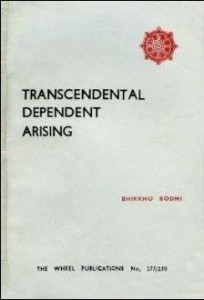 Transcendental Dependent Arising – Tuked away in the Samyutta Nikaya scripture among the “connected sayings on causality” (Nidanasamyutta) is a short formalized text entitled the Upanisa Sutta, the “Discourse on Supporting Conditions.” Though at first glance hardly conspicuous among the many interesting suttas in this collection, this little discourse turns out to be of tremendous importance. Its great significance derives from the striking juxtaposition of two applications of “dependent arising” (paticcasamuppada), the principle of conditionality, which lies at the heart of the Buddha’s doctrine. Download Transcendental Dependent Arising here (328KB/67 pages):
Transcendental Dependent Arising – Tuked away in the Samyutta Nikaya scripture among the “connected sayings on causality” (Nidanasamyutta) is a short formalized text entitled the Upanisa Sutta, the “Discourse on Supporting Conditions.” Though at first glance hardly conspicuous among the many interesting suttas in this collection, this little discourse turns out to be of tremendous importance. Its great significance derives from the striking juxtaposition of two applications of “dependent arising” (paticcasamuppada), the principle of conditionality, which lies at the heart of the Buddha’s doctrine. Download Transcendental Dependent Arising here (328KB/67 pages):
 Transcendental Dependent Arising
Transcendental Dependent Arising
What is the Samyutta Nikaya scripture?
The Samyutta Nikaya, often translated as the “Connected Discourses” or “Grouped Sayings,” is one of the five Nikayas (collections) in the Sutta Pitaka, which is one of the “three baskets” that make up the Pali Tipitaka (the canonical scriptures) of Theravada Buddhism.
Here’s a brief overview:
- Content: The Samyutta Nikaya contains more than a thousand suttas (discourses), grouped together by theme into 56 samyuttas or sections. Each samyutta is organized around a particular topic, featuring dialogues and discourses related to that topic. These topics range from discussions about dependent origination, to the path factors, to conversations about the nature of Nibbana (Nirvana).
- Structure: Each samyutta focuses on a particular subject. For example, there’s a Khandha Samyutta about the five aggregates, an Indriya Samyutta about the faculties, and a Nidana Samyutta about the causes of suffering. This structure makes it easier for monks, scholars, and practitioners to study or teach specific topics.
- Significance: The Samyutta Nikaya is renowned for its detailed teachings on the core doctrines of early Buddhism, such as the Four Noble Truths, the Eightfold Path, and the concept of dependent origination. It provides insight into the teachings of the Buddha and the way these teachings were grouped and organized by early Buddhist communities.
- Usage: The discourses in this collection are often studied for a deeper understanding of specific aspects of the Dhamma. Many Theravada Buddhist monastics and scholars refer to it regularly, and some discourses are used in daily chanting or in meditation retreats to provide insight or inspiration.
If you’re interested in studying or reading it, there are several translations available, both in print and online. As always, when diving into religious or philosophical texts, it’s beneficial to do so with guidance or alongside additional resources to ensure correct interpretation and understanding.
